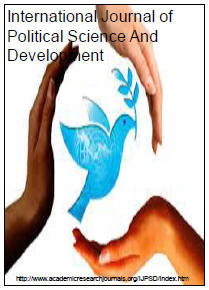| IJPSD |
International
Journal of Political Science and Development |
||||||||||||||||||||||
|
International Journal of Political Science and Development Vol. 3(11), pp. 433–440, December, 2015. DOI: 10.14662/IJPSD2015.049 ISSN: 2360-784X
Research Paper
Public Diplomacy as Method of Conflict Prevention on Nile basin
Tadesse Abebe (M.A)
Wolkite University, College of Social Sciences and Humanities, Section of Journalism and Communication Email- ethiotadde@gmail.com
Accepted 13 November 2015
Ethiopia had
turned a leaf in her foreign policy in the past two decades. The Foreign
Policy and National Security Strategy has redefined and re-evaluated her
priorities, identified the major threats to Ethiopia and indeed to its
survival: economic backwardness and the desperate poverty affecting a
large majority of the population. In particular, with regard to
bilateral relations, the policy clearly stipulated that Ethiopia was
pursuing engagement with all other countries on the basis of the
principle of mutual interest and respect. Relations with all neighbors
over the last two decades have been a testament to the seriousness with
which the country has adhered to these principles. Importantly, Ethiopia
believes that whatever differences countries may have, issues of common
concern can only be addressed on the basis of constructive engagement,
of dialogue and in a manner that allows for a win-win outcome for all.
Ethiopia was determined that the Nile can and indeed should be a source
of cooperation and mutually beneficial relations between Ethiopia, Egypt
and other lower stream country in a whole number of ways. This has not,
however, always been the case. Indeed, the issue of the use of the Nile
water has often been a major sticking point in the relationship, a major
stumbling block to any sort of robust bilateral link that might have
enhanced the interests of both countries. Ethiopia attaches great
importance to its relations with Egypt, over the Nile as in the area of
security. It accepts that Egypt has legitimate interests in the use of
the Nile River. Equally, it sincerely believes that the only way any
controversy over the use of such a common resource can be settled is
through dialogue and the principle of equitable utilization of the
water, without causing significant harm to others. When it comes to
foreign relations, countries will always pursue their national
interests. A sober assessment of the methods used to do this, including
the use of soft power and hard power, is indispensable to success. In
the information age, soft power, which is the ability to shape what
others want and projecting a positive image, stands tall as a technique
to help achieve foreign policy goals? Indeed, public diplomacy through
the employment of soft power has helped countries communicate values and
achieve foreign policy objectives. Cite This Article As: Abebe T (2015). Public Diplomacy as Method of Conflict Prevention on Nile basin. Inter. J. Polit. Sci. Develop. 3(11): 433-440
|
|
|||||||||||||||||||||
